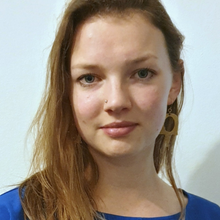4 minute read
Meet the speaker
Amelia Jenkinson is the CEO and co-founder of acclaimed relationship and sex education (RSE) organisation, School of Sexuality Education, which provides comprehensive and inclusive sex and relationships education workshops for UK secondary schools. School of Sexuality Education is the 2018 Winner of the Pamela Sheridan Award for Innovation and Good Practice in RSE, and has worked with over 70,000 young people across the UK.
Amelia will lead workshops at our upcoming Inclusion for All Conference on 1 July 2022 focused on how to support LGBTIQ+ students in schools and how to tackle sexual harassment in schools. Read on to learn more about Amelia's work and what you can expect from her workshops at the conference.
Q&A with Amelia Jenkinson
Q: What can we expect from your workshops at the Inclusion for All conference?
A: In our first workshop, we’ll be addressing how we can address sexual violence through RSE and a whole-school approach. The session will cover the current context of sexual harassment and sexual violence for young people, including digital sexual violence, and the steps that can be taken for effective sexual violence prevention. The second session will look at how we can support LGBTQIA+ students in schools, including understanding key issues, and ideas for inclusive practice and building an inclusive culture.
Q: What was your personal experience of RSE in school and did this impact the work you do today?
A: Like lots of people, my experience of RSE in school was minimal - unsurprising, since it’s only recently been made a statutory requirement. The little RSE that we did get was largely based around risks and harms, for example warnings around teen pregnancy and STIs. There was no comprehensive consent education, certainly no mention of LGBTQIA+ identities or the idea that sex could be anything beyond reproduction. I am mindful of not blaming my school, though. UK schools have not been adequately resourced or empowered to provide a high-quality RSE delivered by trained professionals, and this is really only just beginning to change. Our mission at School of Sexuality Education is in essence to address this gap. We provide inclusive, evidence-based and trauma-informed RSE workshops for young people across the UK. We also provide training for staff to give them the confidence to address these sensitive issues.
Q: What do you think is the biggest challenge facing RSE in schools today?
A: Since RSE has recently been made mandatory, the biggest challenge that we see is schools now needing to meet this requirement. Given that teachers and departments are already working flat-out, finding the time to book in training, source quality teaching resources and review provision is a real challenge. Ideally, RSE would be at the centre of a whole-school approach, with the principles of equity, positive relationships and elevating student voice guiding the school’s ethos - but it takes creative and brave leadership to consider what this means in practical terms and then implement it. School of Sexuality Education aims to provide flexible support to schools during this period of change, whether it’s workshops with our ‘unembarrassable’ facilitator team, auditing a school’s existing RSE curriculum or providing tailored CPD.
Q: What are some of the most common misconceptions around relationships that you come across, and how do you approach these with students?
A: Like all of us, students’ ideas about relationships are shaped by the world around them. Although we all have many positive influences on our ideas of relationships, there are plenty of narrow or even harmful ones too. For example, the idea that if you fancy someone, ask them out and they turn you down, you should just keep asking them, and eventually they might give in. Or, that there’s such a thing as a ‘normal’ relationship or family set-up.
We aim to give young people the critical thinking skills to be able to identify the influences that shape our ideas and consider the impact these have on them and others. For instance, if we only see certain identities represented as the ‘love interests’ in mainstream movies, how does that shape our ideas of who is ‘fanciable’? Or, if we only see men asking out/pursuing/proposing to women, what does that teach us about gender and roles in relationships? By addressing these questions critically but non-judgmentally, we can give young people the skills to unpack key ideas we’re taught about sex, sexuality and relationships.
Attend Amelia's workshops at our Inclusion for All Conference on 1 July at The Tomlinson Centre.
